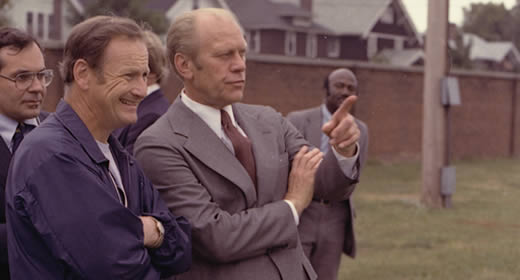
Ten years after the U.S. Supreme Court heard Grutter v. Bollinger, we look back at President Ford's defense of affirmative action in higher education
This June marks the 10th anniversary of the United States Supreme Court's decision in Grutter v. Bollinger, which upheld the use of affirmative action by the University of Michigan Law School.
President Ford played a critical role in helping his alma mater defend itself against two lawsuits that sought to end the ability of schools to consider race in admissions as a tool for building diverse educational settings.
In August 1999, the New York Times published a stirring letter from the former president, publicly and forcefully voicing his support for affirmative action.
Then, from behind the scenes, Ford rallied support for the University's position from top retired military officials including General H. Norman Schwarzkopf, Adm. William J. Crowe Jr., and two dozen others. The generals signed what legal analyst Jeffrey Toobin said "may have been the most influential amicus brief in the history of the Supreme Court." Written by Carter G. Phillips, the brief stated that "the military cannot achieve an officer corps that is both highly qualified and racially diverse unless the service academies and the ROTC used limited race-conscious recruiting and admissions policies."
Here is an excerpt from President Ford's letter to the editor of the New York Times on August 8, 1999.
------
Inclusive America, Under Attack
At its core, affirmative action should try to offset past injustices by fashioning a campus population more truly reflective of modern America and our hopes for the future. Unfortunately, a pair of lawsuits brought against my alma mater pose a threat to such diversity. Not content to oppose formal quotas, plaintiffs suing the University of Michigan would prohibit that and other universities from even considering race as one of many factors weighed by admission counselors.
So drastic a ban would scuttle Michigan's current system, one that takes into account nearly a dozen elements–race, economic standing, geographic origin, athletic and artistic achievement among them–to create the finest educational environment for all students.
This eminently reasonable approach, as thoughtful as it is fair, has produced a student body with a significant minority component whose record of academic success is outstanding.
Times of change are times of challenge. It is estimated that by 2030, 40 percent of all Americans will belong to various racial minorities. Already the global economy requires unprecedented grasp of diverse viewpoints and cultural traditions. I don't want future college students to suffer the cultural and social impoverishment that afflicted my generation. If history has taught us anything in this remarkable century, it is the notion of America as a work in progress.
Do we really want to risk turning back the clock to an era when the Willis Wards* were isolated and penalized for the color of their skin, their economic standing or national ancestry?
To eliminate a constitutional affirmative action policy would mock the inclusive vision Carl Sandburg had in mind when he wrote: "The Republic is a dream. Nothing happens unless first a dream." Lest we forget: America remains a nation with havenots as well as haves. Its government is obligated to provide for hope no less than for the common defense.
*Find the Spotlight on the inside back cover to see a photo from the screening of Black and Blue.
Below is a formatted version of this article from State & Hill, the magazine of the Ford School. View the entire Spring 2013 State & Hill here.